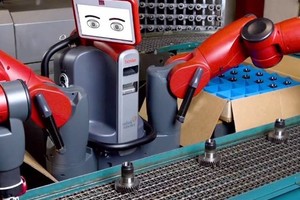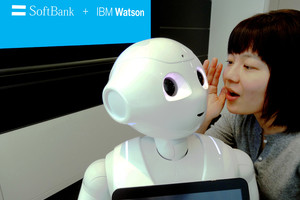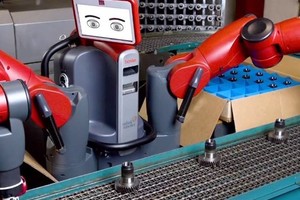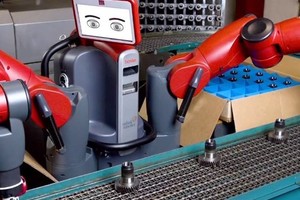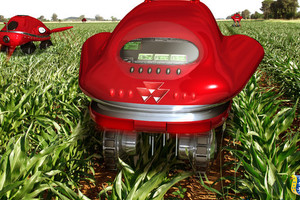Google’s Vision for the Future of Work
For years, the tech giant’s Mountain View headquarters sat on leased property, the corporate equivalent of a rented pad downtown. On moving in, Google did something like a spackle-and-paint job (a costly interior renovation, in 2005), and tried to make the place its own (the famous multicolored bikes).
- 16.06.2015, 09:10 von Editor Uno
- 0 Kommentare
- 19.536 Aufrufe
Killer-Roboter - Die Totmacher
In den Kriegen der Zukunft werden autonome Roboter darüber entscheiden, wer leben darf und wer sterben muss. Ethiker und Menschenrechtler fordern ein Verbot dieser Waffen. Ihre Befürworter glauben, dass sie zu weniger zivilen Opfern führen würden.
- 14.06.2015, 18:06 von Editor Uno
- 0 Kommentare
- 937 Aufrufe
Three wheeler Lindo takes the popular rickshaw to an electrically sustainable stage
Lindo, the electric vehicle based on the piggio ‘ape’, – also know as the rickshaw in developing countries, is planning on changing the transportation system with a more refined mode rather than continuing by making the system inaccessible and difficult to use. the three wheeler was created by kyle armstrong, a young designer at the university of RMIT, in melbourne australia. he based it around a carbon fibre chassis, and titanium space frame that makes it light yet strong and highly durable.
- 14.06.2015, 17:48 von Editor Uno
- 0 Kommentare
- 698 Aufrufe
The robo-squid with a laser weapon that could blast its way through ice to find alien life in Europa's underground oceans
The robo-squid with a laser weapon that could blast its way through ice to find alien life in Europa's underground oceans / Cryobot is designed to tunnel down through thick ice caps / Uses a high powered laser to melt its way through thick ice / Liquid ocean on Europa could be 62 miles (100 kilometers) deep.
A robot sub that could one day scour Europa for alien life has begun tests in alaska. The robotic 'cryobot' is designed to tunnel down through thick ice caps and penetrate subterranean seas, is undergoing tests on the Matanuska glacier in Alaska. It uses a laser to blast its way through ice.
- 14.06.2015, 17:24 von Editor Uno
- 0 Kommentare
- 309.034 Aufrufe
Catching Waves and Turning Them Into Electricity
MELBOURNE, Australia — Off the coast of Western Australia, three big buoys floating beneath the ocean’s surface look like giant jellyfish tethered to the seafloor. The steel machines, 36 feet wide, are buffeted by the powerful waves of the Indian Ocean. By harnessing the constant motion of the waves, the buoys generate about 5 percent of the electricity used at a nearby military base on Garden Island.
- 13.06.2015, 18:54 von Editor Uno
- 0 Kommentare
- 1.072 Aufrufe
This ‘Pac-Man’ computer runs on water droplets
Scientists have created a synchronous computer that operates using the unique physics of moving water droplets.
The computer is nearly a decade in the making, incubated from an idea that struck Manu Prakash, an assistant professor of bioengineering at Stanford University, when he was a graduate student. The work combines his expertise in manipulating droplet fluid dynamics with a fundamental element of computer science—an operating clock.
- 12.06.2015, 11:12 von Editor Uno
- 0 Kommentare
- 754 Aufrufe
Firm reveals plans to raise houses on giant magnets in event of quake
Could 'hover homes' protect California from the big one? Firm reveals plans to raise houses on giant magnets in event of quake
System will be connected to ShakeAlert early warning system. Homes will rise up from ground moments before quake hits. System will use powerful magnets to raise homes above the ground. Firm is also developing a hoverboard for personal use.
- 12.06.2015, 11:05 von Editor Uno
- 0 Kommentare
- 787 Aufrufe
Das erste Hotel mit Roboter-Personal
In Japan eröffnet das erste Hotel mit Roboter-Personal. Gesichtserkennung statt Zimmerschlüssel. Schlechte Laune gibt’s bei diesen Mitarbeitern nicht – höchstens schlechte Programmierung ...
- 11.06.2015, 10:41 von Editor Uno
- 0 Kommentare
- 886 Aufrufe
Wenn der Roboter das Sushi macht
Für kommende Generationen könnte die Zusammenarbeit mit Robotern völlig natürlich werden. Was die Maschinen schon heute alles können. Sehr lässige Pose, wirklich – aber wen interessiert’s? Der junge Mann, der einen fahrerlosen Gabelstapler mit dem Gewicht eines Kleinwagens auf sich zu fahren lässt, keine Miene verzieht, aufreizend regungslos verharrt, bis der Metall-Koloss nur Zentimeter vor ihm wie von Geisterhand zum Stehen kommt, ist im Grunde eine Attraktion von gestern.
- 11.06.2015, 09:56 von Editor Uno
- 0 Kommentare
- 8.913 Aufrufe
Robot Love
With fewer young people around for company and tighter healthcare budgets, an aging population is rightfully concerned about their futures. But engineers are working hard to change that outlook by developing robots that not only allow seniors to continue to live independently, but also cheer them up when they’re feeling low.
People are living longer. In 1956 a 60-year-old British female retiree had a life expectancy of just under 20 years; by 2010 that had extended further by an additional 12 years. Male longevity has similarly increased; a U.S. male born in 1950 might hope to reach his 66th birthday, while his 2010 counterpart can reasonably expect to enjoy at least a decade more.
- 09.06.2015, 12:42 von Editor Uno
- 0 Kommentare
- 917 Aufrufe
Europe’s innovation deficit isn’t disappearing any time soon
In Brussels last month for the annual European Business Summit, I heard a lot of familiar complaints about the EU’s persistent failure to develop a digital economy to match that of the United States and Asia. But with Europe’s industrial economy finally showing signs of recovery, regulators are now turning their attention back to the deferred information revolution — for better and for worse.
- 09.06.2015, 10:53 von Editor Uno
- 0 Kommentare
- 14.770 Aufrufe
Robots square off at the 2015 DRC Finals
A sporting event where a contestant opens a door, promptly falls on their face, and then stands up again sounds like less than riveting, but on Friday some 10,000 people at the Fairplex in Pomona, California, cheered and screamed encouragement as exactly that happened.
- 08.06.2015, 15:36 von Editor Uno
- 0 Kommentare
- 1.056 Aufrufe
Are we ready for the rise of social robots?
Social robots are coming, but will we enjoy their company? Chris Baraniuk explains why it might not always be easy to adjust to our new companions.
- 27.05.2015, 19:40 von Editor Uno
- 0 Kommentare
- 787 Aufrufe
A "fourth industrial revolution" is about to begin (in Germany)
Factories are about to get smarter. The machines that make everything from our phones to our sandwiches rely on creaking technology -- but not for long. "It will make manufacturing more affordable in high wage countries [and be a] major threat to China" Detlef Zühlke, director of innovative factory systems at DFKI
- 22.05.2015, 17:21 von Editor Uno
- 0 Kommentare
- 313.258 Aufrufe
Automating walking is the first step to a dystopian nightmare
If we're really going to outsource walking -- as a professor in Germany proved earlier this year is possible (with the help of some electrodes) -- we'll end up automating all physical activity, from chewing to smiling. This is a dystopian future that Evan Selinger, associate professor of philosophy at Rochester Institute of Technology, hopes we will never want.
- 22.05.2015, 17:07 von Editor Uno
- 0 Kommentare
- 890 Aufrufe
Flying over Dubai — and other places — with jetpacks
Jetman Yves Rossy has been taking his delta-winged jetpack out for brief jaunts at exotic locations around the globe for years. Each time, he learns a little more, and makes his flying machine a little more powerful.
- 21.05.2015, 18:40 von Editor Uno
- 0 Kommentare
- 895 Aufrufe
Internet of Farm Things: How to farm better
Companies are competing to turn data into advice on how to farm better, and attracting investments from the likes of Google Ventures and Monsanto.
- 21.05.2015, 18:22 von Editor Uno
- 0 Kommentare
- 9.552 Aufrufe
The glove that transmits "touch" over the Internet
Blind-deaf people are often forced to live in a small and isolated world. But can a new glove open the way for easier communication? Lesley Ogden Evans reports.
- 21.05.2015, 18:05 von Editor Uno
- 0 Kommentare
- 902 Aufrufe
Collaborative Robots - Befreiung der Roboter
Roboter sind überall, doch man sieht sie nicht. Seit das Wort
- 20.05.2015, 20:50 von Editor Zero
- 0 Kommentare
- 9.292 Aufrufe
Buried Treasures at Raclette
The chef at Raclette stood by the table, holding a great half wheel of warmed cheese that had started to blister and bubble along its exposed diameter. He tilted it, pressed a long knife to the top and scraped down. The cheese seemed to shrug, the melted surface giving way like the side of a mountain coming undone.
- 20.05.2015, 20:27 von Editor Due
- 0 Kommentare
- 835 Aufrufe
Water Flowing From Toilet to Tap May Be Hard to Swallow
Filtering membranes in an Orange County, Calif., water purification facility. The plant opened in 2008 during the state's last drought. Water treated with lime in a tank. Before the water is made available for drinking, it is sent underground to replenish the area’s aquifers and to be diluted by the natural water supply. Individual membranes filter almost all suspended solids, bacteria and protozoa.
- 20.05.2015, 19:25 von Editor Due
- 0 Kommentare
- 14.704 Aufrufe
New machine could one day replace anesthesiologists
Lisa McLaughlin, 49, receives anesthesia from the Sedasys system, a computer-assisted personalized sedation machine, before her colonoscopy at the ProMedica Toledo Hospital in Toledo.
- 20.05.2015, 19:06 von Editor Due
- 0 Kommentare
- 817 Aufrufe
Schneller fahren, höhere Prämie?
Wo, wann, wie schnell: Mehrere Versicherungen arbeiten an Systemen, mit denen sie Autofahrer in Echtzeit überwachen können. Noch ist es Zukunftsmusik, doch vieles deutet darauf hin, dass Versicherungen künftig ihren autofahrenden Kunden auf der Strasse folgen können. Das hat eine Umfrage der Nachrichtenagentur sda ergeben. Diese Live-Lokalisation, ermöglicht durch
- 20.05.2015, 15:21 von Editor Zero
- 0 Kommentare
- 764 Aufrufe
Neustart am Cern
Anderthalb Jahre lang stand der mächtigste Teilchenbeschleuniger der Welt still. Nach den Wartungsarbeiten soll der Large Hadron Collider (LHC), der mächtigste Teilchenbeschleuniger der Welt, nun noch kraftvoller geworden sein. Mit dem Neustart wollen Forscher am Europäischen Kernforschungszentrum (Cern) nun dem dunklen Teil des Universums seine Geheimnisse entreissen.
- 19.05.2015, 20:33 von Editor Due
- 0 Kommentare
- 823 Aufrufe
Deutschland geht das Erdgas aus
In den deutschen Förderregionen geht das Erdgas zur Neige. Zudem drosseln die Niederlande ab 2020 massiv ihre Lieferungen. Ein Milliarden-Umbauprojekt soll nun die Gasversorgung sichern. In den beiden wichtigsten deutschen Förderregionen Elbe-Weser und Weser-Ems hat sich die Förderung von 2006 bis 2013 fast halbiert und wird nach den Prognosen des Öl- und Gasproduzentenverbandes WEG weiter stark fallen.
- 18.05.2015, 11:44 von Editor Zero
- 0 Kommentare
- 896 Aufrufe

